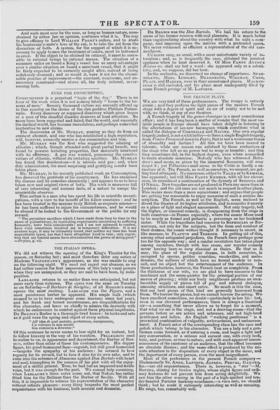THE FRENCH PLAYS.
WE are very fond of these performances. The troupe is entirely comic ; and they perform the light pieces of the modern French stage with a degree of spirit and an air of reality not to be met with, we think, at any of our theatres. A French tragedy of the genre classique is a most somniferous affair; and it has long been a matter of wonder that the most vo- latile people in Europe should have taken delight in listening to the alternations of see-saw harangues which constitute what is called the dialogue of CORNEILLE and RACINE. Our own regular tragedy,indeed, is not a whit better—is there a single English tragedy, from Venice Preserved down to Fazio, that is not a wearisome tissue of absurdity and fustian? All this we have been inured to tolerate, while our reason was subdued by those enchanters of the stage who left us no power but to weep or tremble ; and this they sometimes did, in the highest degree, even when compelled to recite absolute nonsense. Nobody who has witnessed Betel- dent's mad scene, as given by the immortal SIDDONS, will ever forget it ; yet Tilburina's mad scene in the Critic is hardly a ca- ricature of it. The French, as well as ourselves, we suspect, are get- ting tired of tragedy. No successor, either to TALNIA or to KEMBLE, has appeared ; nor will MISS FANNY KEMBLE, with all her clever- ness, be considered a continuation of the dynasty of SIDDONS and O'NEILL. New tragedies are not produced in Paris any more than in London ; and the old ones are not much in request in either place. This seems more than a mere coincidence ; and argues that people are getting too reasonable to enjoy nonsense of such a serious de- scription. The French, as well as the English, seem inclined to divest the theatre of its higher attributes, and to consider it merely as a place of light and elegant amusement. Not only tragedy, but the higher, or classical comedy, is disappearing from the stage in both countries—in France especially, where the comic Muse used to be nearly as formal and pedantic a personage as her buskina sister. While the tragedians had recourse to SopnocLEs or Eu- RIPIDES, not only for the subjects, but the form and conduct of their dramas, the comic writers thought it necessary to resort, in like manner, to PLAUTUS and TERENcE. In getting rid of this, among other antiquated prejudices, the French have perhaps gone too far the opposite way; and a similar revolution has taken place among ourselves, though with less cause, our regular comedy never having been so very classical as theirs. Be that as it may, the place of the regular drama, in both countries, is occupied by operas, petites comedies, vaudevilles, and melo- drames, the authors of which have no formal models to con- sult, and no object but the entertainment of the audience. In these productions, however, the French beat us completely. From the thickness of our wits, we are glad to have recourse to the machinist and the scene-painter for the principal portion of our means of pleasing; while our lively neighbours produce an inex- haustible supply of pieces full of gay and natural dialogue, amusing situations, and smart satire. So much is this the case, that our best pieces of this kind are generally borrowed from them. We borrow the pieces, but we cannot borrow the acting. We have excellent comedians, no doubt—particularly in low life : but, even in our cleverest performances, there is always a theatrical air—a something that never allows us to forget for a moment, that what we see is the stage, and not a drawing-room—that the persons before us are actors and actresses, and not high-bred gentlemen and ladies. An English "walking gentleman" is a proverbial combination of vulgarity, awkwardness, and embarrass- ment. A French actor of the corresponding class has the ease and polish which belong to his character. You see a lady and a gen- tleman come forward, as if entering a room, and begin a light and airy conversation, or a serious and earnest one, with every look, tone, and gesture, so true to nature, and with such apparent uncon- sciousness of the existence of an audience, that the effect becomes an absolute illusion ; and the same effect is produced by the mi- nute attention to the disposition of every object in the scene, and the deportment of every person, even the most insignificant. Most of the performers in the present French company Mademoiselle Sr. ANGE, LAPORTE, ALFRED, PREVAL, CAMARO. &c.—are old acquaintances. There is, however, a "star "—M. BOUFFE, shining for twelve nights, whose slight figure and ordi- nary features do not prevent him from acting delightfully. We saw him the other evening in the part of a high-spirited and ten- der-hearted Parisian hackney-coachman,—a rara avis, we should think ; but he made it extremely interesting as well as amusing. He sings, too, remarkably well.


























 Previous page
Previous page